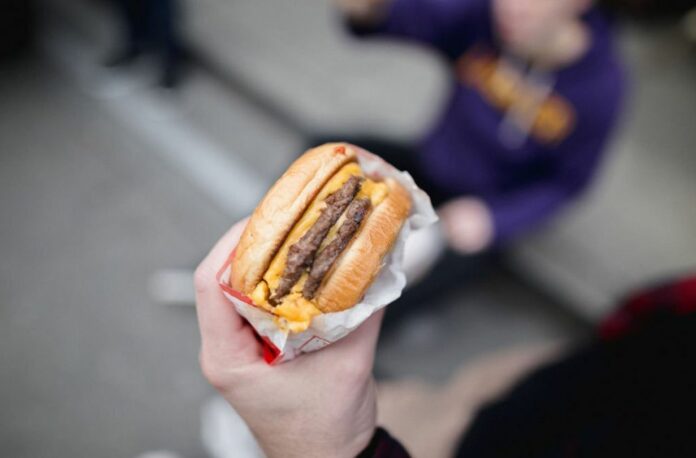A dieter who wants to eat less fat might be tempted to blame his or her tongue because butter and ice cream taste so good. But new research into what makes us hungry has found a completely new link between the gut and the brain that is responsible for our desire for fat.
Scientists at Columbia’s Zuckerman Institute looked at mice and found that when fat goes into the intestines, it sends a signal. This signal triggers a craving for fatty meals when it travels along nerves to the brain. The new research, published today in Nature, suggests that it may be possible to interfere with this gut-brain connection in order to avoid bad decisions and solve the escalating global health crisis brought on by overeating.
“We live in unprecedented times,” says first author Mengtong Li, “in which the overconsumption of fats and sugars is causing an epidemic of obesity and metabolic disorders.”
“If we want to control our insatiable desire for fat,” adds the author, “science is showing us that the key conduit driving these cravings is a connection between the gut and the brain.”
The work that the Zuker lab did on sugar led to this new way of looking at the relationship between what you eat and your health. In the presence of intestinal sugar, researchers discovered that glucose triggers a unique gut-brain circuit that communicates with the brain. Artificial sweeteners without calories, on the other hand, don’t have this effect, which may explain why diet sodas can leave us feeling hungry.
According to Dr. Zuker, the study shows that “the tongue tells our brain what we like, such as things that taste sweet, salty or fatty.”
The gut, however, communicates to the brain what we need and want.
Dr. Li wanted to find out how mice react to lipids and fatty acids, which are fats that every animal must eat to get the building blocks it needs to live. She gave mice bottles of water containing dissolved lipids, including a soy oil component, and bottles of water containing sweet compounds that are initially alluring but are known not to damage the gut.
After a few days, the rats started to like fatty water.
Even after the researchers genetically altered the mice to prevent them from using their tongues to taste fat, they developed this predilection.
“Even though the animals could not taste fat, they were nevertheless driven to consume it,” adds Dr. Zuker.
According to the researchers, fat must be engaging particular brain circuits that are responsible for the animal’s behavioral response to fat. Dr. Li examined brain activity in mice while feeding them fat in an effort to identify that circuit. Neurons in the caudal nucleus of the solitary tract (cNST) of the brainstem became more active. This was intriguing because the lab’s earlier discovery of the neurological basis of sugar desire also involved the cNST.
Then, Dr. Li found the lines of communication that sent the message to the cNST. When mice had fat in their intestines, the vagus nerve, which connects the gut to the brain, also twittered with activity.
Dr. Li first examined the molecular mechanisms underpinning a mouse’s desire for fat before focusing on the endothelial cells that line the intestines. She discovered two sets of cells that responded to fat by signaling the vagal neurons.
“One group of cells functions as a general sensor of essential nutrients, responding not only to fat but also to sugars and amino acids,” explains Dr. Li. “The other group responds to only fat, potentially helping the brain distinguish fats from other substances in the gut.”
Dr. Li then took a crucial step further by utilizing medication to stop the activity of these cells. When either cell group’s signaling was turned off, vagal neurons were unable to react to dietary fat in the intestines. After that, she used genetic methods to either silence the vagal neurons directly or the neurons in the cNST. In both cases, the mouse stopped wanting fat.
“These interventions verified that each of these biological steps from the gut to the brain is critical for an animal’s response to fat,” adds Dr. Li. “These experiments also provide novel strategies for changing the brain’s response to fat and possibly behavior toward food.”
The stakes are really high. Since 1980, the prevalence of obesity has nearly doubled worldwide. Nearly half a billion individuals worldwide have diabetes today.
Especially among low-income individuals and members of communities of color, “overconsumption of cheap, highly processed foods rich in sugar and fat is having a devastating impact on human health,” warns Dr. Zuker.
“The better we understand how these foods hijack the biological machinery underlying taste and the gut-brain axis, the more opportunity we will have to intervene.”
“This exciting study offers insight about the molecules and cells that compel animals to desire fat,” remarks Professor Scott Sternson, from the University of California, who was not involved in the new study. “The capability of researchers to control this desire may eventually lead to treatments that may help combat obesity by reducing consumption of high-calorie fatty foods.”
Image Credit: Getty
You were reading: An Entirely New Link Between Gut And Brain That Drives Cravings For Fatty Foods Has Been Discovered
